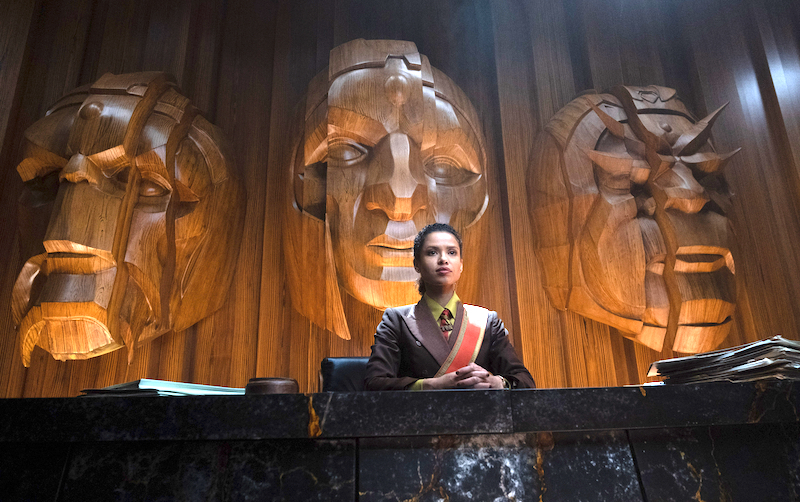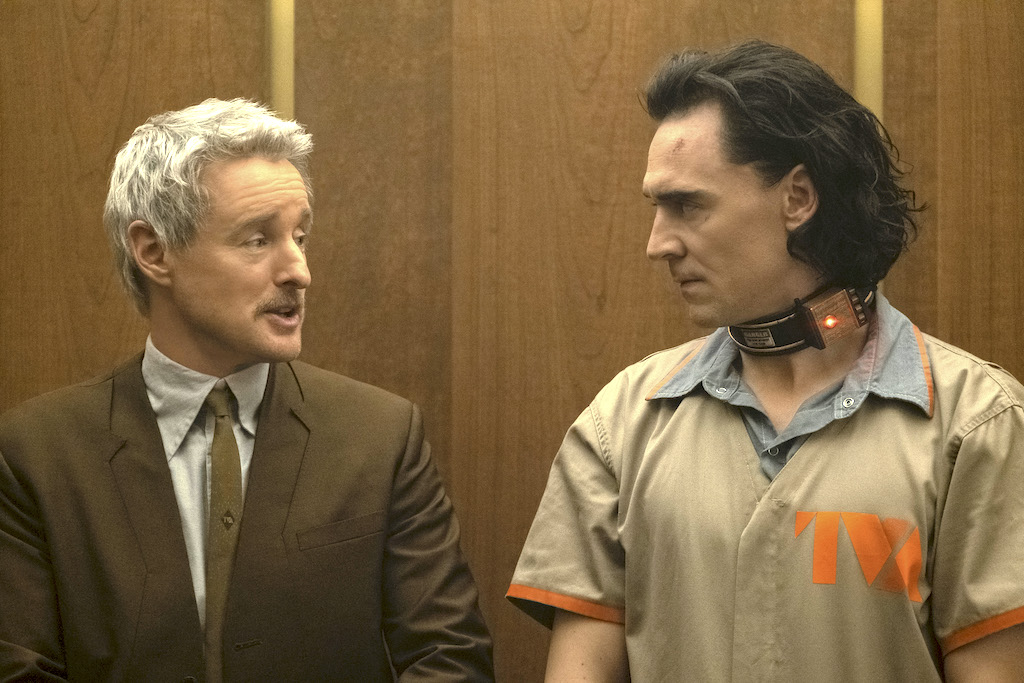Michael Waldron has been busy indeed. Despite being the Head Writer/ EP of Loki, he found time to get his passion project Heels produced and is also working on the Doctor Strange In The Multiverse Of Madness for Sam Raimi. We caught up with Waldron during his downtime to discuss his writing work.
Waldron cut his teeth on the fast-paced, animated sci-fi TV hit Rick and Morty until he established himself as a pro writer. “The aim of each episode [of Rick and Morty] was to introduce the big idea, explain it to the audience quickly, and then telling their emotional story.” This writing template came in handy on Loki which was a show based on time travel where they had to lay out all the rules of the Time Variance Authority (TVA) quickly and efficiently. We asked him how he crafted the TV series.
When the writer sat in the Head Writer’s seat of Loki he had an abundance of source material to consider. Naturally he watched all the Avengers movies before any writing began. Rather than exclusively focusing on the plot and timeline of the MCU characters, Waldron chose to focus on Tom Hiddleston’s performance to create his show. “I wanted this show to be a character piece of Loki as he existed in the [Marvel Comic Universe] MCU.” This formed the bedrock of Loki’s character journey in the new series. He also read additional Loki comics and other stories to fully grasp the depth of Loki’s personality.
The MCU has mined its characters thoroughly to the extent there are ample sequels, prequels and spinoffs of the Marvel world. Waldron “just saw Loki as another chapter,” that could stand alone. “It’s a progression of this ongoing MCU mythology.” Loki, the TV series, picks up where Avengers: Endgame left off. Loki picks up the Tesseract and disappears through a portal in Endgame and winds up at the TVA in the TV show. “It was a direct continuation.”

Michael Waldron. Photo by Cassie Mireya Rodriguez Waldron
The Time Variance Authority (TVA)
The TVA which controls time has a unique relationship with Loki – the God of Mischief. “The TVA knows how things are supposed to play out and show you the set path to get there.” Loki defies this notion by controlling his own fate. He wants to become a king because that is what he believes he’s owed. The TVA had alternative plans for Loki. “He did not become king during Avengers: Infinity Wars and was instead killed by Thanos.” The TVA represents the manager of time and order as well as a force of destiny.
During the previous Avengers movies, Loki was more of a scheming villain. He is portrayed as a more vulnerable mischief maker in the TV series. “Loki hasn’t changed. He only has an increased sense of self-awareness. Loki develops an understanding of who he is and why he’s broken,” said Waldron. The reduced sense of villainy in Loki’s character allows the audience to sympathize with him.
Loki is coming to grips with the departure of his predictive character arc in the series. His life is vastly different than where he thought he should be. He is disoriented and needs to chart a new path. However, he still carries his past with him. “He had to receive love for his father, he was indirectly responsible for his mother’s, reconcile with his brother Thor, and die at the hands of Thanos.” The audience weren’t ahead of him in the series because his family history has already been shown in other films.
Mobius (Owen Wilson) is somewhat of a father and mentor figure to Loki. “He shows more patience with Loki than anybody else ever has. This gives him power over Loki.” Loki is known as the mercurial, crafty villain who gets his way by “weedling in and pushing people’s buttons until he gets his way.”
The TV Writers’ Room
Waldron pooled together a team of sci-fi writers for the series who complimented each other’s storytelling skills. “I had a good sense of the emotional throughline of the show, so they could hone in and write to that.”
After plotting the emotional arcs of the characters, the writing team set the rules of time travel and the TVA. “We built an airtight, institutional knowledge of how this was going to work.” This step was followed by breaking broad plots for the characters and eventually adding them to individual series.
The pivotal first episode ended with the realization that Loki finds out how the rest of his life was going to play out. “We referenced Buzz Lightyear in Toy Story when he finds out his just a toy rather than a Space Ranger.”
Although this is Loki’s story told through his point of view, the show has a number of female characters, Ravonna Renslayer (Gugu Mbatha-Raw), Hunter B-15 (Wunmi Mosaku), and Florence Schaffner (Erika Coleman). Waldron had to flesh out the show and create characters that represented different arms of the TVA. “B-15 represents the military arm and Ravonna is the judge. They all have Loki under their thumbs.” They were all humanized to make them fully realized.

Judge Renslayer (Gugu Mbatha-Raw). Photo by Chuck Zlotnick ©Marvel Studios
Waldron maintained his fast-paced storytelling throughout the series. He has been described as a “story accelerator” by his peers. His philosophy on his style is “don’t drag your feet. Give them the good stuff. It’s not a matter of moving at a million miles and hour. It means getting to the good ideas quicker. Sometimes it means answering story questions sooner than feels comfortable. It keeps the audience off balance by jarring their calibration.” Michael Waldron doesn’t believe in Loki meditating along his journey of self discovery. “Let’s go there in the first episode.“
In the current series, the audience knows who the TVA is after at the conclusion of the first episode. This allows for a slew of new adventures to be introduced in subsequent episodes.
Other Projects
The writer also has two other series under his belt. “Heels is a Georgia-set (Waldron’s home state) family drama about professional wrestling.” Although it isn’t a science fiction story, “like Loki, it’s a show about reckoning with trauma, identity and family legacy.” This stemmed from Waldron’s childhood love of pro-wrestling – his own version of the hero’s mythic journey.
In keeping his involvement with the Marvel Universe, Waldron is sharing writing credit with Jade Halley Bartlett on Doctor Strange in the Multiverse Of Madness (the sequel to Doctor Strange), helmed by Sam Raimi. He’s also writing the new Star Wars film.
In conclusion, Michael Waldron offers his advice to writers, “You gotta finish things. No matter how bad you think the draft is, it’s better than you think. Then you can start the process of making it great by rewriting.”
